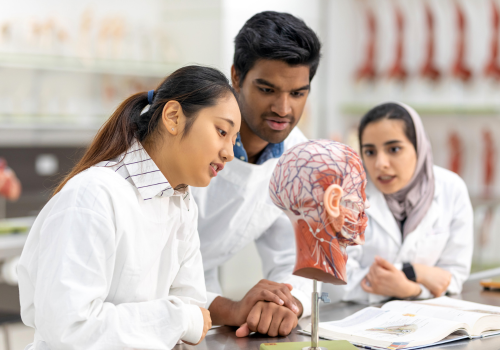Are you passionate about pursuing a career in medicine and becoming a skilled doctor? Are you looking for a top-notch medical education that is both affordable and internationally recognized? If so, then studying MBBS in Georgia might be the perfect choice for you. Situated at the crossroads of Europe and Asia, Georgia has become a popular destination for medical students from around the world, offering a wealth of advantages and opportunities for those seeking to embark on a fulfilling medical journey.
Advantages of Studying MBBS in Georgia
Quality Education
One of the most compelling reasons to consider Georgia for your MBBS is the exceptional quality of education offered by its medical universities. Georgian medical institutions are renowned for their rigorous and comprehensive curricula, cutting-edge facilities, and highly experienced faculty. The emphasis on practical training and hands-on experience equips students with the necessary skills and knowledge to excel in the medical field.

Affordability
Pursuing MBBS in Georgia is remarkably affordable when compared to many other countries. Tuition fees and living expenses are relatively lower, making it a cost-effective option for students from diverse economic backgrounds. This affordability ensures that aspiring medical professionals can focus on their studies without being burdened by overwhelming financial constraints.
Globally Recognized Degrees
Georgian medical universities hold high international acclaim. They are recognized by prestigious organizations such as the World Health Organization (WHO) and the Medical Council of India (MCI). This recognition not only ensures the credibility of the degrees but also opens doors to global career opportunities for graduates.
Multicultural Environment
Studying in Georgia provides a unique opportunity for students to experience a multicultural environment. With a diverse student body from various countries, universities in Georgia foster an inclusive atmosphere that encourages cross-cultural interactions. This exposure enhances students’ understanding of different cultures, promoting global citizenship and preparing them to work in a diverse and global healthcare setting.

Eligibility and Admission Process
To secure admission to a Georgian medical university, aspiring students must meet certain eligibility criteria and go through a comprehensive application process.
Academic Requirements
Aspiring candidates are typically required to have completed their secondary education with a strong emphasis on science subjects, including Biology, Chemistry, and Physics. Minimum GPA and specific subject requirements may vary among universities. It is essential to meet the academic prerequisites to be eligible for the medical program.
Entrance Exams
Most Georgian medical universities conduct entrance exams to assess the aptitude and knowledge of prospective students. These exams serve as a critical component of the selection process, helping universities identify students with the necessary potential and dedication to excel in the medical field.

Application Process
Applying to Georgian medical universities involves submitting detailed applications, including academic transcripts, standardized test scores, letters of recommendation, and a statement of purpose. Adhering to the application deadlines is crucial to ensure a smooth admission process.
Top Medical Universities in Georgia
Georgia is home to several esteemed medical universities that have gained recognition for their academic excellence and modern infrastructure.
Tbilisi State Medical University
Tbilisi State Medical University stands as a leading medical institution in Georgia, known for its exceptional faculty and world-class facilities. The university offers a comprehensive MBBS program that covers all aspects of medical education, including theoretical knowledge and practical training.
Ivane Javakhishvili Tbilisi State University
Ivane Javakhishvili Tbilisi State University is one of the oldest and most prestigious universities in Georgia. It is highly regarded for its commitment to academic excellence and research-driven approach to medical education.
Batumi Shota Rustaveli State University
Batumi Shota Rustaveli State University is a popular choice among both local and international students for its well-rounded medical program and emphasis on research and innovation.
David Tvildiani Medical University
As the first non-governmental medical university in Georgia, David Tvildiani Medical University is known for its progressive approach to medical education. It offers students ample opportunities for practical learning and global exposure.
Curriculum and Teaching Methodology
The medical curriculum in Georgia is designed to provide a comprehensive understanding of medical sciences and clinical practices.
Medium of Instruction
The medium of instruction for most medical programs in Georgia is English, making it convenient for international students to pursue their studies without facing language barriers.
Practical Training
Practical training and hands-on experience play a crucial role in the medical curriculum. Students undergo clinical rotations in various hospitals and healthcare settings, allowing them to apply their theoretical knowledge in real-world scenarios.

Clinical Rotations
During their course, students undertake clinical rotations in various departments, including Surgery, Pediatrics, Gynecology, and Internal Medicine. This exposure enables students to gain valuable experience in diagnosing and treating patients under the guidance of experienced medical professionals.
Student Life in Georgia
Studying MBBS in Georgia offers a vibrant and enriching student life experience.
Accommodation Facilities
Most Georgian medical universities provide on-campus and off-campus accommodation options for international students, ensuring their comfort and safety.
Food and Cuisine
Georgia is renowned for its unique and flavorful cuisine. Students have the opportunity to savor a variety of delicious dishes and explore the rich culinary traditions of the country.

Safety and Security
Georgia is known for its warm hospitality and safe environment. This assurance of safety provides a sense of security to both students and their parents.
Language and Culture
While the medium of instruction is English, learning the local language and embracing the culture can enhance the overall experience of studying in Georgia.
Learning Georgian Language
Many universities offer language courses for international students to help them communicate effectively with patients and the local community. Learning the Georgian language also fosters deeper cultural immersion.
Immersion in Georgian Culture
Embracing Georgian traditions, festivals, and customs enriches the student’s understanding of the country’s heritage and fosters a sense of belonging.
Work Opportunities and Residency
After completing their MBBS in Georgia, international students have various career prospects and residency options.

Work Permits for International Students
The Georgian government provides work permits to graduates, allowing them to gain valuable work experience in the country.
Post-Graduation Residency Options
Graduates can explore residency programs in Georgia or pursue opportunities in other countries, depending on their career goals and aspirations.
Challenges and Solutions
While studying abroad comes with its challenges, a proactive approach can help overcome them.
Language Barriers
Language barriers can be addressed by taking language courses and actively engaging with local students and faculty to improve language proficiency.
Adaptation to a New Environment
Adapting to a new environment can be made easier by participating in university events, clubs, and societies, as well as making friends from different backgrounds.
Conclusion
Studying MBBS in Georgia is a transformative experience that sets the stage for a successful medical career. With its high-quality education, multicultural environment, affordable costs, and global recognition, Georgia offers aspiring doctors an unparalleled opportunity to excel in their chosen field. The exposure to diverse cultures, practical training, and immersion in the Georgian way of life add depth and richness to the educational journey, preparing students to become compassionate and competent medical professionals.

